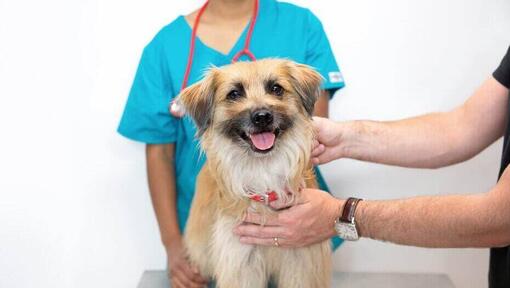


Diabetes is a complex disease that most often develops in older dogs. Just like in humans, diabetes in dogs can cause a range of unpleasant symptoms. However, with careful management, this condition doesn’t need to affect their quality of life.
What is diabetes in dogs?
Dog diabetes, or ‘canine diabetes’, is caused by either a lack of insulin in your dog’s body or, in some cases, an ‘inadequate’ biological response to it. When your dog eats, the food is broken down. One of the components of their food, glucose, is carried to their cells by insulin.
If your dog can’t produce enough insulin themselves, or the insulin they have isn’t used properly, the glucose cannot be used properly either. This means your dog’s blood sugar levels will rise, which can lead to adverse side effects.
What causes diabetes in dogs?
Just like in humans, it isn’t completely certain why some dogs develop diabetes. Some dogs may be more genetically prone to developing the condition. It is known, however, that being overweight can increase the risk of your dog developing diabetes. This may be because obesity causes cells in your dog’s body to become more resistant to insulin.
If your dog develops diabetes, it is most likely to happen when they start to reach their senior years. Female dogs and neutered dogs may also be more at risk.
What are the symptoms of diabetes in dogs?
There are many symptoms of diabetes in dogs. If you notice any of the following, ask your vet for advice, as they could indicate the condition:
- Excessive thirst
- Increase in urination
- Unexplained weight loss
- Appetite changes
- ‘Sweet-smelling’ breath
- Tiredness or lack of energy
- Urinary tract infection
- Loss of eyesight
If your vet suspects that your dog may have diabetes, they will most likely carry out a blood test to help their diagnosis. If your dog has diabetes, they will be able to advise you on the best course of action.
Is there a cure for dog diabetes?
Unfortunately there is no cure for diabetes in dogs. However, dog diabetes is a condition that can usually be managed by the owner. With proper management, your dog can still enjoy a full and happy life.
How can I manage dog diabetes?
To manage diabetes in your dog, you should aim to keep your dog’s blood sugar levels at a ‘normal’ level. Your vet will be able to help you do this, and prescribe an ongoing treatment plan for your dog. Usually, ongoing treatment will involve:
- Regular insulin shots (up to twice a day)
- Monitoring your dog for changes in their symptoms
- Regular check-ups with the vet
- Some dogs may benefit from a dog food specifically designed for diabetic dogs, such as PURINA® PRO PLAN® VETERINARY DIETS Canine DM Diabetes Management.
What is the recommended diet for dogs with diabetes?
It’s important to stick to a strictly regulated diet that’s full of the nutrients your dog needs in order to keep their blood sugar levels low. You should generally avoid feeding them any snacks that contain molasses, syrup, dextrose, maltose, or fructose. Instead, go for dehydrated foods, carrots, snap peas, or canned pumpkin as treats. You can also opt for chicken, as long as it’s boiled and is not seasoned with any salt, butter, or oils.
Lots of water is key in any diet for dogs with diabetes because without it, the sugar stays in their bladder and doesn’t get flushed out. So it’s best to keep their water bowls full and fresh in order for them to get the fluids they need.
Also, when feeding your dog, make sure to maintain a mealtime routine and stick to serving the same type of food. Giving them the same food every day at the same time is beneficial.
Are there any options for treating dog diabetes without insulin?
Although it’s strongly recommended that you use insulin when treating diabetes in dogs, there are alternative ways, like changing their diet and exercise routine. Keep in mind though that this is a less effective and more costly alternative because it involves using natural herbs, supplements, acupuncture, or even massage therapy to regulate their blood glucose levels.
If you are thinking about treating dog diabetes without insulin, then it’s vital that you talk to your trusted vet first so that they can recommend the best approach.
How can I help prevent my dog developing diabetes?
It’s impossible to guarantee that your dog will never develop diabetes. However, ensuring that your dog enjoys a healthy lifestyle can reduce the risk. Tips for a healthy lifestyle include:
- Feeding them a complete and balanced diet
- Helping them retain an ideal body condition, i.e. not being overweight
- Getting enough exercise for their age and food intake
Other conditions to watch out for
If your dog has diabetes they will be more prone to some other conditions, so it’s important to keep an eye out for anything unusual. Diabetic dogs are more prone to:
• Cataracts – these may develop in response to excess sugar levels affecting the eyes. Cataracts can be removed by surgical correction, although many dogs cope well with reduced eyesight, as their sense of smell and hearing is so much better than ours.
• Urinary tract infections – excess sugar in the urine can increase the risk of your dog developing these. Keep an eye out for increase urination or discomfort when urination, and ask your vet for advice.
Next, check out some of the more unusual signs of illness in dogs you should watch out for.

Explore our dog brands:
More articles by Pro Plan Vet Diets






















